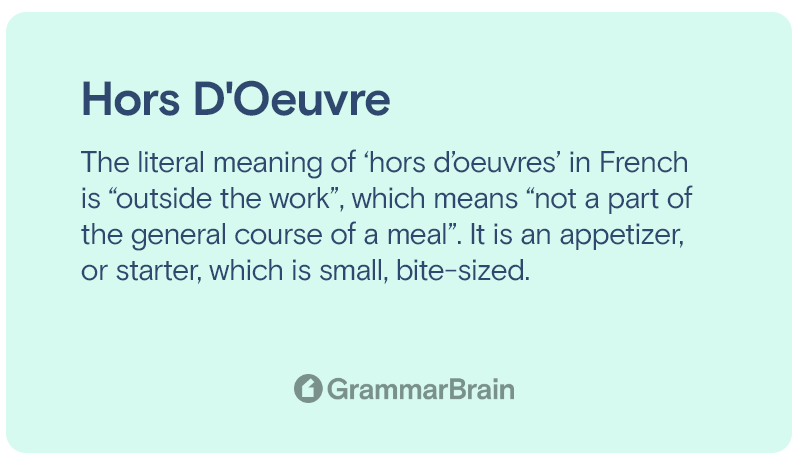‘Hors d’oeuvres’ is one of the most commonly mistaken and arguably difficult words, while writing, in pronunciation, typically due to the inclusion of an apostrophe in the spelling.
Meaning of Hors D’Oeuvres
The literal meaning of ‘hors d’oeuvres’ in French is “outside the work”, which means “not a part of the general course of a meal”. It is an appetizer, or starter, which is small, bite-sized. They are made using chopped, or shredded spicy meats, fish, or cheese, sometimes served on crackers or toast. They may be served hot or cold, depending upon the requirement and in accordance with the occasion.

Difference between Hors D’Oeuvre and Entrée
The key differences between an hors d’oeuvre and an entrée are –
a. In America and Canada, an entrée is usually considered the main course of a meal. An hors d’oeuvre is an appetizer that is bite-sized & munched before the main course.
b. But in some European countries, hors d’oeuvre & entrée are synonyms, referring to a petite dish, sometimes for drinks as well. They may be taken in order to stimulate one’s craving before the meal.
c. ‘Hors d’oeuvres’ in French means “outside the meal”, while ‘entrée’ means entrance or start.
Origin and Etymology
The French word ‘hors d’oeuvres’ (pronounced as awr-durvz) originates from the 17th century, deviating from a previously used word called entrements. Modern-day entrement is also often called an entrée (pronounced as awn-tray). The word was first used in 1714. Since while pronouncing the word, the first letter ‘h’ is silent, the indefinite article ‘an’ should be used as the preceding article for the singular noun.
Types of Hors D’Oeuvres
They can be served at the table before the commencement of the meal, or like a savory snack before the seating, at a wedding reception for example.
There are five types of cold hors d’oeuvres, namely canapés, crudités, dips, caviar, sushi & sashimi.
As far as hot hors d’oeuvres are concerned, they are brochettes, meatballs, wrapped and filled. Although it comes of French origin, it is more used in European cuisine.
Sentence use and examples
It is simply used as a proper noun.
A few examples are as follows:
1. They served a variety of hors d’oeuvres at the fancy party along with sweet and cool refreshments.
2. Miss White experimented with the leftovers to make delicious the hors d’oeuvres we are all so heartily enjoying.
3. Denise was amazed at the tangy taste of the hors d’oeuvre, and exclaimed “I have never had anything like this before!”
4. Monica complained, “They should have presented the guests with some hors d’oeuvres at the least.”
5. I prefer starting with some hors d’oeuvres before the main course.
Conclusion
In conclusion, hors d’oeuvres is a complex word, but it can be pronounced with not much difficulty once it gets understood in terms of terminology and frequent use. It can be used synonymously or interchangeably with appetizers or starters. Many would agree it to be a fancy word, which finds its proper use among the elite societies of first-world countries.
Inside this article
Fact checked:
Content is rigorously reviewed by a team of qualified and experienced fact checkers. Fact checkers review articles for factual accuracy, relevance, and timeliness. Learn more.
Core lessons
Glossary
- Abstract Noun
- Accusative Case
- Anecdote
- Antonym
- Active Sentence
- Adverb
- Adjective
- Allegory
- Alliteration
- Adjective Clause
- Adjective Phrase
- Ampersand
- Anastrophe
- Adverbial Clause
- Appositive Phrase
- Clause
- Compound Adjective
- Complex Sentence
- Compound Words
- Compound Predicate
- Common Noun
- Comparative Adjective
- Comparative and Superlative
- Compound Noun
- Compound Subject
- Compound Sentence
- Copular Verb
- Collective Noun
- Colloquialism
- Conciseness
- Consonance
- Conditional
- Concrete Noun
- Conjunction
- Conjugation
- Conditional Sentence
- Comma Splice
- Correlative Conjunction
- Coordinating Conjunction
- Coordinate Adjective
- Cumulative Adjective
- Dative Case
- Determiner
- Declarative Sentence
- Declarative Statement
- Direct Object Pronoun
- Direct Object
- Diction
- Diphthong
- Dangling Modifier
- Demonstrative Pronoun
- Demonstrative Adjective
- Direct Characterization
- Definite Article
- Doublespeak
- False Dilemma Fallacy
- Future Perfect Progressive
- Future Simple
- Future Perfect Continuous
- Future Perfect
- First Conditional
- Irregular Adjective
- Irregular Verb
- Imperative Sentence
- Indefinite Article
- Intransitive Verb
- Introductory Phrase
- Indefinite Pronoun
- Indirect Characterization
- Interrogative Sentence
- Intensive Pronoun
- Inanimate Object
- Indefinite Tense
- Infinitive Phrase
- Interjection
- Intensifier
- Infinitive
- Indicative Mood
- Participle
- Parallelism
- Prepositional Phrase
- Past Simple Tense
- Past Continuous Tense
- Past Perfect Tense
- Past Progressive Tense
- Present Simple Tense
- Present Perfect Tense
- Personal Pronoun
- Personification
- Persuasive Writing
- Parallel Structure
- Phrasal Verb
- Predicate Adjective
- Predicate Nominative
- Phonetic Language
- Plural Noun
- Punctuation
- Punctuation Marks
- Preposition
- Preposition of Place
- Parts of Speech
- Possessive Adjective
- Possessive Determiner
- Possessive Case
- Possessive Noun
- Proper Adjective
- Proper Noun
- Present Participle
- Prefix
- Predicate



